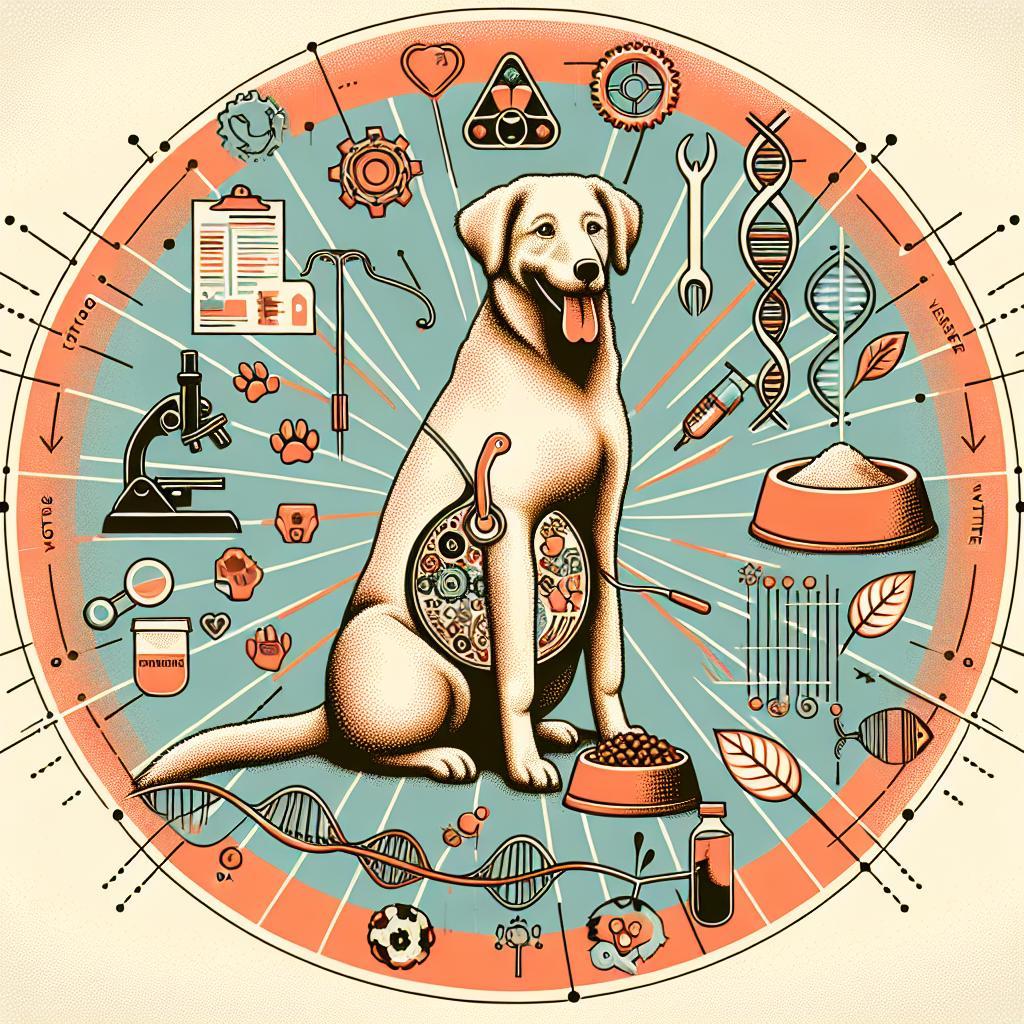Bringing a new life into the world is a journey filled with excitement, anticipation, and an array of choices. For expectant dog owners, this journey begins with the most fundamental aspect of care: nutrition. Choosing the right dog food for pregnant dogs is not just about filling a bowl; it’s about fostering a healthy environment for both the mother and her growing pups. With an overwhelming array of options on the market, from specialty formulas to organic blends, navigating this landscape can be both daunting and confusing. In this article, we’ll explore the key considerations and nutritional needs that should guide your decision-making process, ensuring that your furry friend receives the nourishment she needs during this crucial time. Join us as we unveil the essential ingredients for creating a thriving pregnancy and setting the stage for a happy, healthy litter.
Understanding the Nutritional Needs of Pregnant Dogs
Pregnant dogs experience significant physiological changes that necessitate a tailored diet to support their health and the development of their puppies. The nutritional requirements during this critical period increase, and it’s essential to provide a balanced diet enriched with vital nutrients. Key components to focus on include:
- Protein: High-quality protein sources promote tissue growth and repair. Aim for foods that contain at least 25-30% protein.
- Calories: Expecting mothers need more calories to accommodate the growing litter. Gradually increase their caloric intake by up to 25% in the later stages of pregnancy.
- Fats: Healthy fats provide energy and support fetal development. Incorporate sources of omega-3 and omega-6 fatty acids.
- Vitamins and Minerals: Look for foods fortified with essential vitamins like A, D, E, and B-complex, as well as minerals such as calcium and phosphorus.
To simplify the process of selecting the right dog food, consider comparing ingredients and nutritional content. Below is a sample comparison table that illustrates some ideal nutrients and recommended targets for pregnant dogs:
| Nutrient | Recommended Amount |
|---|---|
| Protein | 25-30% |
| Fat | 15-20% |
| Calories | Up to 25% more than usual |
| Calcium | 1.2-1.8 g/kg |
By carefully monitoring and adjusting their diet to meet these increasing nutritional demands, you can ensure the health and vitality of both the mother and her puppies.

Key Ingredients to Look for in Premium Dog Food
When selecting premium dog food for pregnant dogs, it’s essential to focus on the quality of ingredients that will support both the mother and her growing puppies. Look for the following key ingredients:
- High-Quality Proteins: Ingredients like whole meats (chicken, beef, lamb) provide the essential amino acids vital for fetal development.
- Healthy Fats: Sources such as fish oil or chicken fat are crucial for energy and brain development.
- Essential Vitamins and Minerals: Look for added calcium, phosphorus, and omega fatty acids to support overall health and growth.
- Digestible Carbohydrates: Ingredients like sweet potatoes and brown rice can provide sustained energy and fiber.
Additionally, consider the inclusion of probiotics and prebiotics to aid digestion and bolster the immune system during this critical time. A good balance of antioxidants found in fruits and vegetables can help protect against cell damage, further ensuring the health of the mother and her pups. When examining the product labels, ensure these ingredients are listed early in the ingredient list, indicating they are present in significant amounts. Below is a summary table of beneficial ingredient types:
| Ingredient Type | Benefits |
|---|---|
| Proteins | Supports muscle development and energy |
| Fats | Provides energy and supports brain health |
| Vitamins & Minerals | Essential for growth and overall health |
| Carbohydrates | Source of energy and dietary fiber |
| Probiotics | Aids digestion and boosts immunity |

Avoiding Harmful Additives and Fillers
When selecting dog food for pregnant dogs, it is essential to scrutinize the ingredient list for potentially harmful additives and fillers that can detract from the nutritional value of their diet. Ingredients like artificial colors, flavors, and preservatives may seem innocuous but can cause adverse reactions in sensitive dogs. Additionally, common fillers such as corn, soy, and wheat can offer little to no nutritional benefits and may lead to allergies or digestive issues. Opting for high-quality dog food with minimal processing ensures a diet rich in essential nutrients, fostering a healthier pregnancy for your canine companion.
To aid in your search for the best dog food, consider looking for options that emphasize natural ingredients. The following types of ingredients are preferable:
- Whole meats (e.g., chicken, beef, or fish)
- Whole grains (e.g., brown rice or oats)
- Fruits and vegetables (e.g., blueberries, spinach, or sweet potatoes)
- Healthy fats (e.g., fish oil or flaxseed)
This list can serve as a guideline to nurture not only the health of the mother but also the development of her puppies. A transparent ingredient label that reflects these qualities can significantly enhance the overall well-being during this vital time.

Tailoring Feeding Portions and Schedules for Expecting Mothers
When it comes to feeding pregnant dogs, understanding their nutritional needs is essential for both the mother and her developing puppies. Portion control plays a significant role in ensuring the expecting mother receives all the necessary nutrients without overfeeding. It’s advisable to gradually increase the dog’s calorie intake as her pregnancy progresses, particularly during the last trimester. This can be done by dividing her daily food allowance into smaller meals throughout the day:
- First Trimester: Maintain regular feeding schedule and portions.
- Second Trimester: Increase portions by 10-20%.
- Third Trimester: Increase portions by 20-50% as needed, depending on the dog’s size.
In addition to adjusting portion sizes, scheduling feeding times can help ensure the pregnant dog stays comfortable. It’s beneficial to feed her at the same times each day to create a routine that minimizes stress. Offering highly digestible food with high-quality protein sources can also contribute to better health outcomes for both the mother and her puppies. Here’s a simple guide to meal frequency during pregnancy:
| Trimester | Feeding Frequency |
|---|---|
| First Trimester | 2 meals per day |
| Second Trimester | 2-3 meals per day |
| Third Trimester | 3-4 meals per day |
Q&A
Q: Why is choosing the right dog food especially important for pregnant dogs?
A: During pregnancy, a dog’s nutritional needs change significantly. Just like humans, pregnant dogs require more calories and nutrients to support the growth of their puppies. It’s crucial to provide them with a balanced diet that promotes both the mother’s health and the development of the unborn pups.
Q: What specific nutrients should I look for in dog food for pregnant dogs?
A: Pregnant dogs need a diet rich in protein, essential fatty acids, calcium, phosphorus, and vitamins such as A, D, and E. These nutrients help in the healthy development of puppies and ensure the mother maintains her energy levels and overall health.
Q: Can I switch my pregnant dog to a puppy food formula?
A: Yes, many veterinarians recommend switching to a high-quality puppy food during pregnancy. Puppy formulas often contain higher protein and fat levels, which can meet the increased calorie demands of a pregnant dog. However, always consult your veterinarian before making any changes.
Q: How can I determine the right amount of food for my pregnant dog?
A: The quantity of food will depend on your dog’s size, breed, and stage of pregnancy. In the early stages, around 10-20% more food may suffice, but as the pregnancy progresses, this can increase to 50% more or even higher. Monitoring her body condition and consulting with your vet will help ensure she’s getting the right amount.
Q: Are there certain ingredients or additives I should avoid?
A: Yes, it’s advisable to avoid dog food that contains artificial preservatives, fillers, and by-products. These ingredients can be low in nutritional value and may not support the health of your pregnant dog. Instead, seek out brands with whole food ingredients and no unnecessary additives.
Q: How should I introduce new food to my pregnant dog’s diet?
A: A gradual introduction is key. Start by mixing a small portion of the new dog food with her current food over a week or so. This will help transition her palate without upsetting her digestive system. Watch for any signs of allergies or intolerance during this process.
Q: Can my pregnant dog still have treats?
A: Yes, but opt for healthy treats that are nutritious and low in calories. Veggies like carrots or specially formulated dog treats that complement her diet can be great options. Just be mindful of the total caloric intake to avoid unnecessary weight gain.
Q: Should I continue feeding my pregnant dog the same food after she gives birth?
A: After giving birth, the mother’s dietary needs will shift again, particularly as she begins nursing. You can continue with puppy food to support both her recovery and the increased nutritional demands of nursing puppies. Monitor her weight and consult your vet to adjust her diet accordingly.
Q: How important is hydration for a pregnant dog?
A: Hydration is extremely important! Ensure your pregnant dog has constant access to fresh water. Proper hydration supports overall health and aids in digestion, especially if she’s eating a higher protein diet.
With these insights, you can confidently choose the right food for your pregnant furry friend, helping her thrive through her pregnancy and prepare for motherhood!
Future Outlook
selecting the right dog food for your pregnant pup is a journey that requires careful consideration and a touch of love. As your furry friend embarks on this beautiful chapter of motherhood, providing her with a balanced, nutrient-rich diet is paramount for her health and the development of her puppies. Remember to consult with your veterinarian to tailor her nutritional needs and ensure that she receives the best care possible. By investing a bit of time and effort in researching quality ingredients and understanding dietary requirements, you’ll be setting the stage for a happy, healthy litter. Ultimately, nurturing your pregnant dog with the right food not only supports her well-being but also paves the way for the flourishing lives of her adorable offspring. As you prepare for the pitter-patter of tiny paws, know that your commitment to her nutrition will echo in the playful, vibrant energy of the puppies to come. Happy feeding!

